


Under orders from wild American friend Odell to snap the ‘cutest female cop’ I could find, I captured a sensuous and moodily lit portrait of a lady constable by whom I wouldn’t mind being wrestled to the ground any day, but who is very much not his type. His uncultivated tastes lead him to hanker after the bim-babe look. Otherwise, the pro-democracy rally yesterday was the usual parade of irksome crowd control measures, pressmen and banner-wielding activists, plus a cross-section of the bit-above-average portion (in terms of looks, IQ, schooling, money, etc) of the city’s population. Also as usual, there is a discrepancy between different sources’ estimates of the turnout. What would the numbers look like if the organizers had to pay a dollar for every participant they reckoned came along, and the person counting for the Police got paid a buck for every marcher spotted?
Like Anson Chan, I found it impossible to plod the entire distance. Barely had the march begun, I squeezed onto a sidewalk and zipped ahead to ensure the route as far as Wanchai was clear of danger. I couldn’t help noticing that the big TV on Hennessy Road showed ex-Chief Executive Tung Chee-hwa, who has been awarded a Grand Bauhinia Medal for having “…led Hong Kong to overcome the Asian financial crisis…” Apart from Charles Lee of the Stock Exchange, the only other recipient of Hong Kong’s highest honour is Tung Tai Securities’ (I had to look it up) Cav. Gr. Cr. Dr. Leo Lee Tung-hai, GBS, OBE, Chev Leg d' Hon, Comm Leopold II, LLD, JP, apparently for “…promoting the community's understanding of the motherland…” He has certainly enhanced my impression of the country as a place where extreme sycophancy, of the sort that nets ridiculous-sounding titles and baubles, is considered cool.
Another thing I noticed on this one-man reconnaissance mission was that for every marcher there was a supportive (mostly) spectator lining the street and overhead walkways, patiently awaiting the demonstrating throng. Also, Communist-funded Ta Kung Pao didn’t seem in any hurry to pull its shutters down. All seeming well, I repaired to one of the neighbourhood’s disco dungeons, in which I found Odell clutching a cold beer with one hand and a pouting bim-babe of uncertain Southeast Asian provenance in the other. “This is a bit better than sweating with tens of thousands of others out on the street,” he told me. Not if your wife walks in, I was too hot to say.
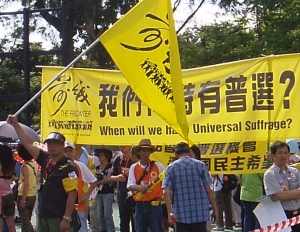
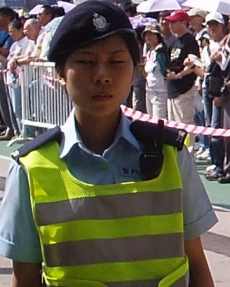
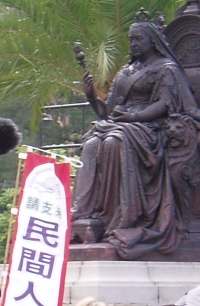
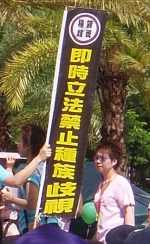
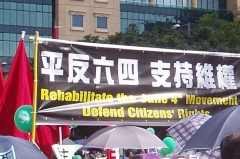

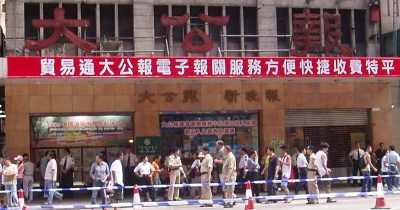
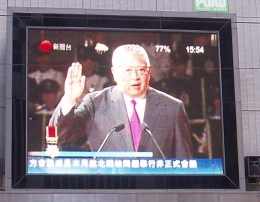
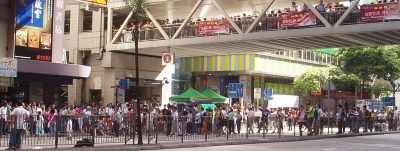
A few thoughts come to mind as I throw last Saturday’s South China Morning Post into the bin.
In the long run, Hong Kong’s pro-democrats have history on their side. Dictatorships are a dying breed. China is run by Leninists hoping to cling to power by delivering the very economic reforms that will undermine them. In the shorter term, the city’s pro-Beijing crowd have the upper hand. Simply by toeing the correct ideological line, they qualify as full and trusted members of the local ruling inner circle.
Or so they like to think. In practice, the bulk of them are stooges. Members of the cumbersomely named Democratic Alliance for the Betterment and Progress of Hong Kong have been trained to enjoy it. As pro-communist patriots with decades of anti-colonial activism behind them, they are numb to shame and will instantly declare black to be white if told to. Others, with no principles to cushion the blow, feel humiliation and indignation at being publicly used. This particularly applies to the nematodes of the Liberal Party, a clutch of self-centred representatives of industries that have seen better days. Their only unifying ideology – if it can be called that – is that the interests of their favourite business sectors should take precedence over the well-being of Hong Kong as a whole.
Much to their frustration, this ‘screw everyone else’ philosophy has inexplicably thwarted their ambitions to gain at least some measure of public support. Nor has it won them credibility in the halls of power. Their attempts to present themselves as big, grown-up policymakers have somehow failed to inspire either the public or officials. One of their legislators, Miriam Lau, effectively called on the Government to make it legal for minibus drivers to run red lights. They oppose mass transit rail lines – again, to help bus drivers. Their big idea to save the economy a couple of years ago was ‘build a casino’. Eight year olds could do better.
In Saturday’s paper, the Liberals’ dim-witted but weasel-like boss, James Tien, warned that his party might withdraw support for our dashing Chief Executive Donald Tsang if they are not given a role in policymaking. He then offered an example of what we could expect if Sir Bow-Tie were to draw on the mighty combined intellect of his team…
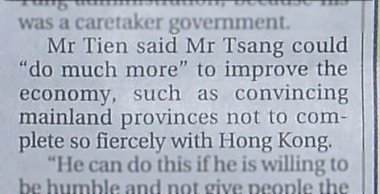
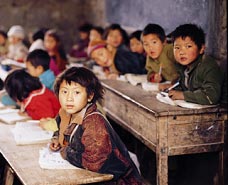
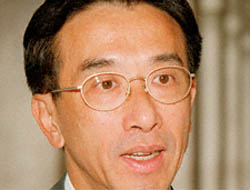
Tue, 4 July
Today is the day the American branch of the Hemlock family drops its usual diet of grits and squirrel and breaks out the Twinkies – the succulent sponge cakes that, thanks to the technology of the extraterrestrials that introduced them to our planet, have a shelf life of 100 years. The delightful and nutritious confections will be baked into a lasagna and served at a party attended by all able-bodied and mentally functioning residents of their remote Appalachian community. A soda-tasting will take place, with connoisseurs swirling samples of Coca Cola, Pepsi and Dr Pepper around their delicate palates, intensely debating the bouquets and other merits of various vintages. The day will end with fireworks, to celebrate a little-understood episode in which a group of troublemakers, unrepresentative of the overall population, dressed up a tawdry tax revolt as a heroic reclamation of the liberties that were their birthright as offspring of the Glorious Revolution of 1689. In all fairness to them, the rebels had already suggested electing members to the motherland’s Parliament – an idea that was greeted with fits of laughter by the few folk in London who were paying attention.
Meanwhile, 230 years later, the British Hemlocks and all their compatriots still don’t get it. Gordon Brown, who represents a district in Scotland, might replace Tony Blair as Prime Minister of the UK. He will therefore have responsibility for England’s education, social service and other domestic policies that are managed by regional governments in Scotland, Wales and Northern Ireland. The answer – give England home rule too and leave the UK Government with purely federal responsibilities – is apparently too mind-boggling for the country that launched the US, Canada and Australia to handle.
But who am I, thousands of miles away, to say? All I know is that…
She is plunging into the yawning gap between the two blocs and announcing that it is indeed possible to be both ‘pro-Beijing’ and ‘pro-democracy’. By accepting Beijing’s preconditions without question, she is making it hard for anti-democrats to disagree with her. By declaring genuine elections feasible at the earliest possible date now 2007-08 are out, she is making it equally difficult for the pro-democrats to find fault, unless they want to quibble about an upper legislative chamber reserved for functional interests. It may be intellectually dishonest, cynical, cunning or even naïve, but it’s not difficult. It obviously helps if you have nothing to lose in terms of street cred or Mainland business interests. Behold the thinking man’s Anson Chan.
Wed, 5 Jul
The Big Boss finds himself off-guard in the morning meeting, uncertain what to make of Regina Ip’s thesis-cum-political platform. We know this because he asks his dynamic and highly alert senior management team for their opinion – and listens. Our Mainland fixer Freddy Mao reminds us of the unusual visit the iron butterfly made to senior Communist Party security and judicial officials in Beijing just before her last day in office in late July, 2003. She still has admirers up there, he says. Ms Lu the buck-toothed Company Secretary senses burning ambition in the widow’s eyes and warns us not to be fooled by her new, less domineering hairstyle. The spotty accountant points out that Ip’s ideas are far from new but appear insightful and objective coming from someone with at least one foot in the pro-Beijing camp. I mention that Regina is committing a heresy by implying that the Basic Law is not perfect. Hong Kong’s mini-constitution is based on what we in the Big Lychee now know to be false assumptions, but Beijing seems to remain adamant – ‘if that political structure worked OK in the late 70s, it should work now’.


Hong Kong asks Beijing for something, but our evil communist overlords in the State Council refuse to grant the city’s wish. It is a familiar enough story. First, political reform – now, panda bears. Mainland Officials to Ocean Park – Drop Dead, shout the angry headlines. Except this time, I can’t help wondering whether the tyrants of Zhongnanhai are in fact doing us a favour. Does the Big Lychee really need pandas?
These so-called bears sit around chewing and yawning, scratching themselves, vaguely looking around but obviously not taking anything in. Why import exotic beasts from Shechuan Province to do that when any group of teenagers on the MTR will provide identical levels of visual and anthropological excitement?

The week ends with some thoughts for the Big Boss, who has asked whether Regina Ip counts as a pro-democrat.
Larry Diamond, Regina’s tutor at Stanford, tells the SCMP that his former student “has been on a political and intellectual journey that has led her to a sincere conviction that Hong Kong needs to move forward expeditiously to full democracy.” Yesterday, a less renowned academic from an equally less renowned Hong Kong tertiary institution blasted the lady in the paper’s letters page, saying he would have given her thesis a D and accusing her of being just another pro-Beijing anti-democrat.
But it is the differentiation between Regina and the anti-democrats that is interesting. In the Basic Law, universal suffrage can only be introduced in Hong Kong under certain conditions – progress must be ‘gradual and orderly’ and ‘in light of the current situation’. ‘Interpretation’ of the law by the Standing Committee of the National People’s Congress has established that Beijing’s approval is required every step of the way. Pronouncements by Mainland legal ‘experts’ have erected additional obstacles – there must be balanced representation, reform must help the development of capitalism, only patriots can be elected, anti-subversion laws must be enacted and national education enhanced. As if that’s not enough, the Hong Kong Government demands that its 7 million citizens arrive at a consensus on reform before it can take any action.
Pro-democrats meet these conditions head-on, disputing their relevance or validity. But being right and logical is of little help when it leaves you ‘challenging’ Beijing. When you do that, Beijing switches the sound off, and you are left debating a brick wall. The anti-democrats, ranging from traditional patriots to tycoons, pick their favourite obstacles to democracy and talk them up with relish. What Regina is doing is saying she accepts the conditions and agrees they are important, but they are actually no problem to meet and we must go ahead and introduce democracy ASAP because the current system is a shambles.
Exposure to the Big Boss and his peers over the years has made it clear to me that tycoons’ fears (even more vehemently expressed behind closed doors than in public) of democracy leading to welfarism are not mere excuses to keep the existing system. Our captains of industry genuinely, totally believe that voters are as shallow as they are and would automatically vote for whoever will transfer the most wealth. By embracing the old idea of a bicameral legislature with business representation in an upper house (probably with limited veto powers and limited shelf-life) Regina Ip is hoping to convince the tycoons to support a more radical overhaul of the relationship between the legislative and executive branches.
No-one should be fooled by the butter-wouldn’t-melt-in-my-mouth biography for the HK Democratic Foundation. Regina’s political and intellectual journey has led to an opportunistic destination. She is ambitious. It would be a waste of time for her to parrot the mainstream pro-Beijing line aimed at dragging reform out for decades – that’s a crowded field. She is taking a risk and occupying vacant ground between the two camps. Neither camp, left to its own devices, will succeed in fixing our broken political system. If democracy is a pragmatic means to better government, rather than a noble ideal, this is pro-democracy.